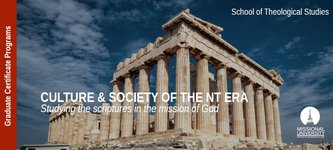
The Graduate Certificate in the Culture & Society of the New Testament Era provides the student of the scriptures with a deep understanding of the impact the interaction of Roman culture and society with Greek/Hellenistic culture and society had on the ideas and social setting of the New Testament writings. Students begin their focus on the religious arena of Second Temple Judaism and the political developments of Hellenistic culture and Roman governmental administration during the inter-testamental period that shaped the society of first-century Palestine. Students evaluate the interaction between the Jewish community, the pagan religious communities, and the emerging Christian communities as evidenced in the scripture and secular texts from the period. Students examine the development of New Testament Christianity as it related to the ancient empires of the time period, especially in light of emperor worship. Students also address theological and religious issues of debate and controversy as illustrated in the religious art of Judaism and early Christianity.
A missional interpretation of scripture requires the biblical student to study the text within its own social, cultural, economic, political, and religious context as a foundation for understanding its relevance to today's sociocultural setting. Students gain insights from the Graduate Certificate in the Culture & Society of the New Testament Era as they study ways in which the first-century and subsequent societies were both influenced by Hellenistic ideas and customs but also dominated by Roman law, governmental & political structures, and ideas of class, status, and military influence. As they observe ways in which early Christian believers wrestled with these issues, students gain an understanding of how early Christians navigated the boundaries between insiders and outsiders while simultaneously extending the gospel to those beyond the Christian faith community.